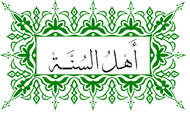Deobandi
From Wikipedia, the free encyclopedia
A Deobandi (Urdu: دیو بندی) is an individual, who follows the methodology of the Deoband Islamic movement. The movement began at Darul Uloom Deoband (a madrasah) in Deoband, India, where its' foundation was laid on 30 May 1866.[1] Its' six notable founders were Muhammad Qasim Nanotvi, Muhammad Yaqub Nanautawi, Shah Rafi al-Din, Sayyid Muhammad Abid, Zulfiqar Ali, Fadhl al-Rahman 'Usmani and Rashid Ahmad Gangohi[2]. The Deobandi movement gained significant traction in the early 1900s mainly due to the activities of its graduates. They, in many instances, played a key role in establishing similar institutions in other parts of the Indian subcontinent.[citation needed]
Deobandis are considered to be within the confines of Sunni Islam (Ahl as-Sunnah wa’l-Jamā‘ah).[citation needed] They follow the Ash'ari and Maturidi schools of aqidah (creed). In fiqh (Islamic jurisprudence) they primarily follow the Hanafi school of law while they accept the validity of the remaining three schools of Sunni Islam, namely the Shafi`i, Maliki and the Hanbali schools. In the spiritual science of Tasawwuf (Sufism) they follow the Chishti, Naqshbandi, Qadiri and Suhrawardi orders.[3][4]
The Deobandi thought, which originated in a north Indian town, has eventually reached many countries, such as Pakistan, Afghanistan, South Africa and the United Kingdom.[citation needed]
Since the 1920s the Deobandi apolitical stance has taken shape in the transnational movement Tablighi Jamaat, but Islamist trends such as those of Pakistan's Jamiatul Ulama-i Islam and Afghanistan's Taliban have also emerged from the ranks of the Deobandis. [5]
Contents |
[edit] History
Gradually, through organisations such as Jamiat Ulema-e-Hind and Tablighi Jamaat, their influence began to spread, and hundreds of schools and Darul ulooms affiliated with Deobandi sprouted.[citation needed] Notable Deobandi seminaries include:
- Mazahir al-`Ulum, Saharanpur, UP, India
- Darul 'Uloom Karachi, Karachi
- Jamia Ulome Islamia Banuri Town, Karachi
- Jamia Binoria, Karachi
- Jamia Ashrafia, Lahore, Pakistan
- al-Jami`ah al-Madaniyyah, Lahore, Pakistan
- Dar-ul-Aloom HanfiaChakwal,Pakistan
Early Deobandi scholars include Muhammad Qasim Nanotvi, Maulana Rashid Ahmad Gangohi, Husain Ahmed Madani, Ashraf Ali Thanwi, Muhammad Ilyas al-Kandhlawi, Ubaidullah Sindhi, Hakeem Mian Ghulam Jilani and Muhammad Zakariya al-Kandahlawi.
Other prominent adherents of the past include Shabbir Ahmad Usmani and Waheed uz-Zaman.
[edit] Notable Deobandi movements
[edit] Dawah (Tableeg)
[edit] Education
- Darul Uloom Deoband
- Jamia Uloom-e Islamia, Banori Town Jamshed Road, Karachi[6]
- Jamia Binoria
- Jamia Ashrafia
- Darul 'Uloom Karachi
- Madrassah Inaamiyyah[7]
- Khatm-e-Nubuwwat Movement (Hong Kong) China.
- Dar-ul-Aloom Hanfia Chakwal
[edit] Political
- Jamiat Ulama-i-Hind[8]
- Jamiat Ulema-e-Hind
- Jamiat Ulema-e-Islam
- Jamat-e-Islami
[edit] Present
[edit] Prominent scholars
- Mulana Salimullah Khan
- Muhammad Taqi Usmani
- Muhammad Rafi Usmani
- Dr abdul razzaq iskandar
- Mufti Mahmud
- Qari Muhammad Tayaib Qasmi. President of Khatm-e-Nubuwwat Movement(Hong Kong).
- Pir Abdul Raheem Naqshbandi
[edit] Prominent adherents
Mawlānā Tariq Jameel, Pakistan, is a well-known and prominent member of Tablighi Jamaat, a movement founded by Darul Uloom Deoband's Mawlānā Muhammad Ilyas al-Kandhlawi, Tahir Anwar, San Francisco Bay Area the U.S., Azizul Huq, Bangladesh, Mufti Ebrahim Desai, Camperdown, [Shaykh Abdul Mumin] Bangladesh,Fazlul Huq Amini, Bangladesh and Mufti Husain Kadodia, South Africa, Qari Muhammad Tayaib Qasmi (Hong Kong).
[edit] In the United Kingdom
According to The Times, about 600 of Britain's nearly 1,400 mosques are run by Deobandi affiliated scholars, and 17 of the country's 26 Islamic seminaries follow Deobandi teachings, producing 80% of all domestically trained Muslim clerics.[9][10][11]
[edit] See also
[edit] References
- ^ Brief Introduction to Deoband
- ^ The Six Great Ones at Darul Uloom Deoband
- ^ Sunni Razvi - The Renewal Movements "... became disciples of Hajji Imdad Ullah Makki (1817-99) in the Chishti order (and secondarily in the Qadiri, Naqshbandi, and other orders).Their common commitment to the reform of customary ritual practice, and to an emphasis on hadis scholarship in the Shah Wali Ullah tradition, further cemented the relationship."
- ^ Biography of Sufi Saint Haji Imdadullah Muhajir Makki "The greatest of them is Shaykh Qasim (al-Nanotwi), Shaykh Rashid Ahmad (al-Gangohi), Mawlana Ya’qub (al-Nanautwi), Molwi Ahmad Hasan (al-Amrohi), Molwi Muhammad Husayn and Molwi Ashraf ‘Ali (al-Thanawi). All of them became shaykhs and many people benefited from them."
- ^ http://www.oxfordislamicstudies.com/article/opr/t125/e522?_hi=20&_pos=1
- ^ Jamia Banuri
- ^ Madrassah
- ^ Jamiat Ulama-i-Hind
- ^ takeover of British mosques -Times Online
- ^ A toxic mix of fact and nonsense | Comment is free | guardian.co.uk
- ^ "Few people realise the extent to which the Deobandis have infiltrated mosques, schools and Muslim neighbourhoods across the country. The ultra-conservative movement, with modern roots in Pakistan's madrassas, now controls more than 600 mosques. It runs 17 of Britain’s 26 Islamic seminaries, and they produce 80 per cent of home-trained Muslim clerics." Times Online September 7, 2007
[edit] Bibliography
- Zaman, Muhammad Qasim (2002). The Ulama in Contemporary Islam: Custodians of Change. Princeton University Press. ISBN 0691096805.
